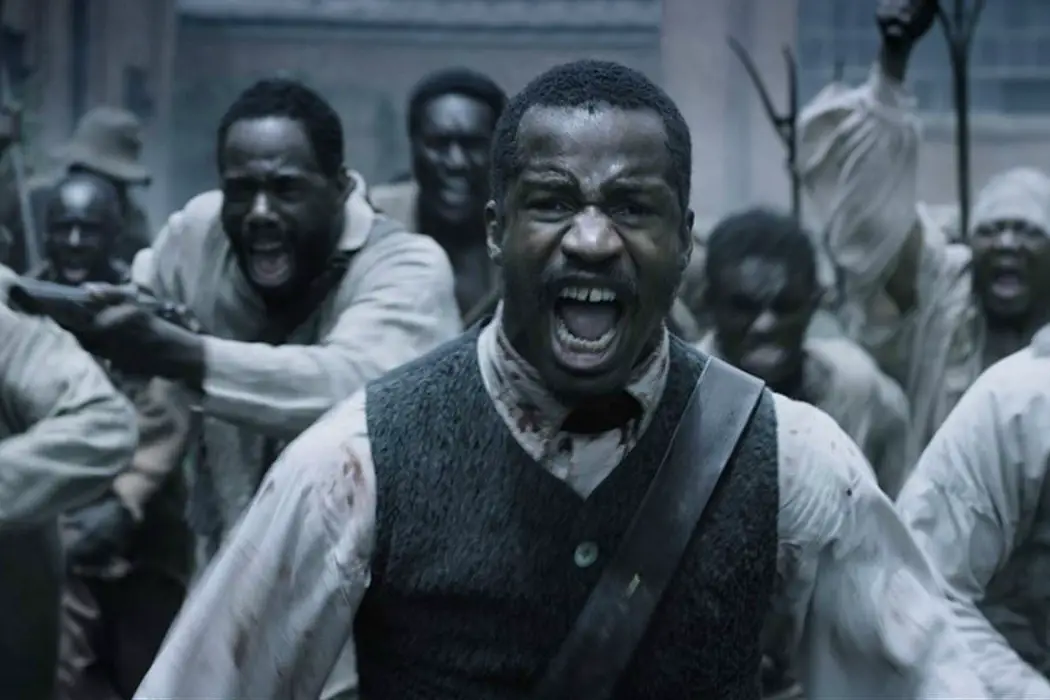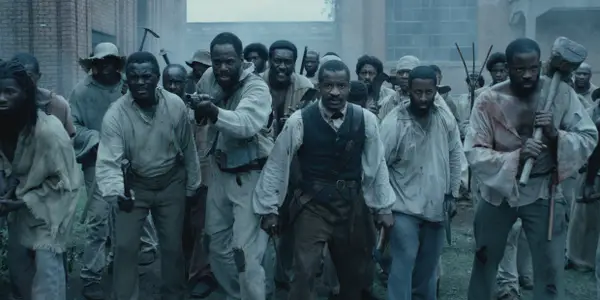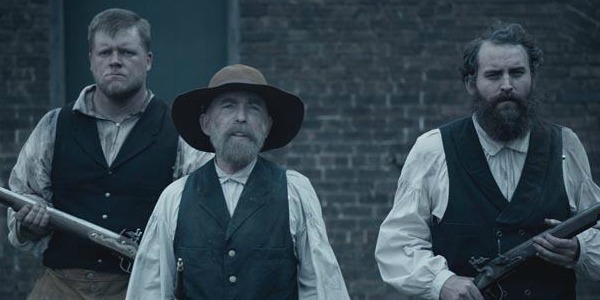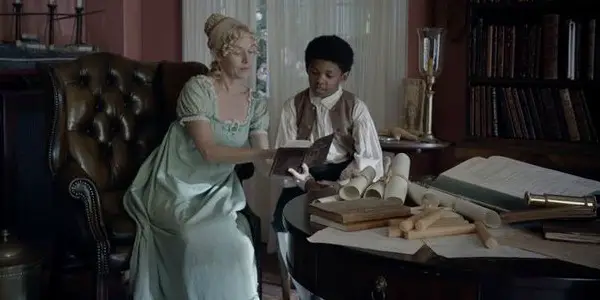THE BIRTH OF A NATION: The Most Depressive Film Of 2016

Stephanie Archer is 39 year old film fanatic living in…
Last year, our country found itself face-to-face with tackling our issues of social injustice. Equal pay and diversity became a focal point – with Hollywood and the Academy of Motion Arts and Sciences receiving a drastic backlash. #OscarsSoWhite became a trending topic, pointing out the lack of diversity among members and nominees. It’s only fitting that the world of independent film would have an immediate response.
Premiering at last year’s Sundance Film Festival, The Birth of a Nation, by director/writer Nate Parker, became the film that everyone was talking about – an early Oscar contender. I personally had waited all year to see this film – the highly glorified talk surrounding it making it a top contender on my “must-see” list. Yet, after viewing this film, it is one of my least favorites of the past year.
While it is a well-done reminder of the horrors and tribulations bestowed upon a group of individuals because on the color of their skin, The Birth of a Nation was a film that dragged on, bringing viewers into a deeper and deeper depth of depression. The filming had dark overtones, solidifying the depression and despair this film was trying convey – giving a deeper catharsis than I had been willing to commit to.
The Birth of a Nation
The Birth of a Nation begins with a ritualistic homage to the land and tribes that so many African-Americans were taken from, a brief opening scene that swiftly throws viewers into the horrors of the south. A black man is stopped on the road by three men on horseback, their leader Raymond Cobb (Jackie Earle Haley) demanding to see his papers (a document given by a slave owner that gives the slave permission to be off the property). When it is revealed that he has none, Raymond begins to muscle him, speaking of what they are allowed to do to a slave they find without papers. The man fights them back, killing all but Raymond – a crime punishable by death.
Before running and trying to flee, he stops at his home on the plantation to warn his family of the danger coming, and that he would be leaving them for good. He kisses his family goodbye, before disappearing into the night. Young Nat (Tony Espinosa), having just seen his father’s desperate departure, comes face-to-face with Raymond, the man from the road. Never once lowering his glance, Nat stares the man down, unafraid of him or the terror that he could bring to his family.

In the days and years that follow, Nat Turner (Nate Parker) has grown into a strong, strapping man of labor – working a variety of tasks on the plantation – most frequently picking cotton. Yet, due to the encouragement of knowledge from the woman of the house, Nat is an educated slave, able to read the words of the Lord and with this, preaches to the slaves of the property.
With his knowledge of reading and preaching comes an opportunity for the plantation to make extra money – lending Nat’s words to other plantations in the area. Yet, with this benefit to the plantation, it becomes a curse for Nat. While his owners have a kind, more gentle heart (as much as one can have that owns slaves), Nat is exposed to and witnesses the gut-wrenching horrors and abuse slaves of other plantations are forced to endure. Compounded by the brutal beating of his wife by the same man who hunted down his father, Nat becomes resigned to fight and lead a rebellion, believing God had chosen him to free his people.
Beyond the Story
Nat Parker is the core of this film, not only writing and directing, but encompassing the film’s leading man. His performance, while mesmerizing, was not as brilliant as the work he did behind the scenes. His script and direction, while depressive and unrelenting in its subject matter, will have a larger impact on audiences than his performance. Writing this review, I found myself focusing more on what was in the film, than those who had portrayed the characters throughout it.

Behind the scenes, Parker’s desire to honor the past shone through each scene and depiction of horror that he chose to display. The amount of information, imagery, and themes compressed into this film are impressive and flowed with a slow fluidity from one to the other. Yet, after finishing it, it did appear as though he may have become consumed by the history that he was trying to emulate on screen. There was so much information compressed into one film that viewers will leave overwhelmed and lost in the despondency the film creates.
The lighting and cinematography of a film can set whatever mood a director is looking for an audience to feel. It enhances emotion and illicit a response. The Birth of a Nation was a film leeched of its lightning. Throughout the entire film, the lighting was of a low contrast, bringing the mood of loss, depression, and hopelessness as low as possible for viewers. There are very few moments within the film when the lighting is lifted – these scenes targeted by Parker and cinematographer Elliot Davis to create a deeper impact and give power to the themes and subject matter it encompassed. Scenes of marriage and worship are allowed more light, giving a sense of hope and normalcy. This increase in lighting was also used as a means to open our eyes to the brutality of the south – such as the final moments of revenge that were taken out on the slave community due to Nat’s rebellion, made clear for all to see.
Brutality of The South
To understand what could push someone to fight back, one must understand what conditions were like at the time, and the fear that filled the lives of a slave – we need a backstory. Director Nate Parker made careful and deliberate decisions concerning the imagery of brutality he wanted to impose on his audience. The Birth of a Nation really hammered, with little relief, in the brutality and the lives that the slave community was forced to endure and fear. Bodies lay on the side of the road, a clear sign to all that if you escape, you will be caught and pay with your life. We have all heard the stories of the terror that filled every moment of a slave’s life, but to sit and watch it for two hours with very little changes in the depressive tone of the film will leave viewers feeling drained.
It is not just the imagery in the background (bodies and auctions) that Parker used to make an impact, but the continuing abuse viewers witness with the characters on screen, as well as the abuse done to them. Nate’s wife, Cherry (Aja Naomi King), encompasses both these forms. Viewers watch as she is surrounded by Raymond and his new crew, accused of lacking the papers she requires when fetching her master’s water. She is brutally beaten – and left for dead. Yet, it is not just the aftermath of her we see, but of what Nat sees. Earlier, he had witnessed the abuse and salesmanship towards Cherry at a side-of-the-road auction. As viewers, we see as he does – the marks on her wrists from the shackles that have held her, as well as the auctioneer ripping off her clothes to show her off – make her more desirable to buyers.

Viewers also watch with Nat the horrors inflicted by other plantation owners. One of the owners of a neighboring plantation which Nat and his master Sam Turner (Armie Hammer) visit talks of how he is saving on the cost of slave ownership. He boasts that he has cut his slaves down to one meal a day – and further shows what he does to slaves who disrespect him. Viewers will feel the gut-wrenching agony of the abuse, many flinching and looking away as Nat and Sam do.
Yet, Parker did not leave the brutality of the south confined to only slave owners. No, the brutality is at its worst when one of your own betrays you. This betrayal may stem from a fear of what will happen if you do not turn your own kind in, yet it is the psychological brutality that causes one to lose their fight, to be unable to overcome fear. While many bore their scars on their skin, many would carry their abuse in their hearts.
The Caring Capacity of a Slave Owner
While there is no debate in regards to the brutality and inhumanity of enslaving a group of people based on their skin color, Parker did take a moment to examine those slave owners who swayed from the norm, posing a debate in regards to whether slaves were cared for because they had property value – or because their owners actually cared. In the early moments of the film, Nat’s father runs for his life, abandoning his family after attacking a small band of white men who had questioned and threatened him on the road back. One of the surviving men, Raymond, comes to the plantation to interrogate his family, yet he is threatened by the plantation owner – “You harm them, I’ll call the sheriff.” The owner steps in shortly after, as the man begins to threaten the small child, Nat; protecting his slaves from the man’s brutality. Did he protect them because they were of property value – or because he genuinely cared about what happened to them?
Yet, how could someone who owns humans as slaves care? This deepens the debate further, raising the question on what is one’s capacity to love and care. If as slave owners they did care, were they only able to do so in a slave owner capacity? The plantation owner’s wife, Elizabeth Turner (Penelope Ann Miller), fits this description perfectly. She cares for her slaves, but in a slave owner capacity. Noticing that young Nat can read, she encourages his learning further – yet not without limitation. She tells Nat that his kind would not understand the books white folk read, but that there was a book perfect for him – the Bible. She encourages him only so far.

Elizabeth Turner continues to show as the film continues, however, that her capacity goes further than just encouraging the education of a small child, but also through a genuine heartbreak, as her son, who once treated his slaves with a greater kindness, began abusing, punishing, and whoring his slaves. The limit of her capacity is also shown as she does nothing to stop her son – or even speak up for the people her heart breaks for. Again, she only does so much.
The Birth of Racism
The Birth of a Nation also tackles the ever-standing debate of the origin of racism. Is racism something that we are innately born with or is it something that we are taught? Early on in the film, viewers watch as Sam, the son of the plantation owner, plays with Nat; while we know Nat is a slave, they seem to play as though they were equals.
As grown men, Sam (played by Armie Hammer) seems to still care and protect Nat when in public and in his home life, even allowing him to marry a slave on another plantation. When Nat’s wife is brutally beaten, he allows Nat to immediately stop what he is doing and rush to be by her side – where we find Elizabeth Turner at Cherry’s bedside, comforting their young child.
Yet, as the influence of those around them begins to seep in, Sam begins to change – his way of viewing his slaves evolving into more of a business man. His desire to make the plantation as glorious as it once was consumes him, so he begins to punish Nat when he is defiant, whore out one of his slave’s wives, and care little to their needs. As viewers, we see, only once, the inner turmoil with the decisions and actions Sam has made when he looks into the heartbroken eyes of his mother. It is in this moment we know – he was taught better than that.
Conclusion
The Birth of a Nation was a heavy film to watch, every element one right after another, plunging viewers into a deep depression. Jam-packed with debatable arguments, themes, and imagery, this film is sure to stir up an emotion – but in an overloaded fashion. While it was beautifully filmed and excellently casted, everything was overshadowed by the dark overtones that weighed heavily on the film and viewers – as well as the length that was made to feel unbearably long. This, unfortunately, is not a film for everyone – and sadly not a film I could see myself recommending to most people.
Have you seen The Birth of a Nation? Tell us what you thought in the comments below!
Does content like this matter to you?
Become a Member and support film journalism. Unlock access to all of Film Inquiry`s great articles. Join a community of like-minded readers who are passionate about cinema - get access to our private members Network, give back to independent filmmakers, and more.













